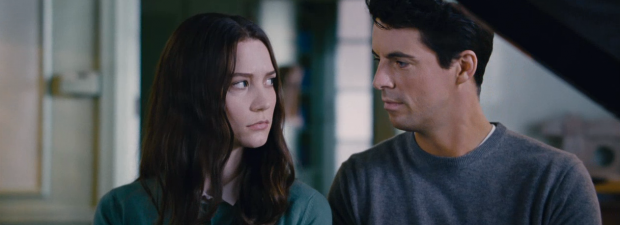
Park Chan Wook’s transition to Hollywood appears to have been a smooth one, and here he has created a subtle and beautiful looking piece of work. This is surprising for a director who has been associated with extreme cinema, from Oldboy’s (2003) live octopus scene to his subversive, bloody take on the vampire genre Thirst (2009). His films contain a consistent theme of cruelty and revenge, all framed impeccably by his regular cinematographer Chung-hoon Chung. Whilst the more extreme elements have faded into the background here, that doesn’t mean Stoker holds back in its intensity.

The film focuses on India (Mia Wasikowska) and her distant mother Evelyn (Nicole Kidman), who are informed that the father of the family has died in a car accident. Then along comes Charlie (Matthew Goode) who begins to settle in during the grieving process, where he then begins to get a bit too comfortable. As picked up by many, the film heavily takes influence from Hitchcock’s Shadow of a Doubt to great effect, as it is obvious that Charlie is not what he seems. Yet ambiguity is not restricted to Charlie himself. Both India and Evelyn are both hard to read, although the manner in which the film plays with their motivations is what grips us. Kidman really sells a character who troubles herself with introspection, both as a wife and mother, albeit one who is simultaneously heartbroken by her loss and difficulties, but seduced by this new, mysterious presence in the family. However, it is Wasikowska who is a revelation here, both underplaying the moody teenager whilst evoking a fairytale like figure on a path of awakening and self discovery. Goode on the other hand provides the charming but eerie figure of this new family, and he has some cracking lines; when playing piano with Evelyn, he slowly turns around to India and beckons her to “Come play with us”. With these personalities at play, the film generates some brilliantly tense scenes, that and some disturbing chemistry which only goes wrong as conflicts rise.

As mentioned the film is beautifully shot, and I would go as far to suggest that this is perhaps one of the best looking films this year. Not only that, but it is ripe with visual symbolism that you’ll be scratching your head for days trying to recollect it all. These visual elements are admittedly heavy handed and deliberately obscure at times, one could even argue that it is unnecessary. However, it’s what makes the film so distinctive, as it creates a dark and fantastical atmosphere enjoyed by India’s character; emphasis is placed on her ability to perceive the world through enhanced senses learned through hunting. This results in a form of sensuality that compliments this story of connection and discovery.
The story itself unfolds rather simply, and anyone looking for plenty of subtexts and complicated narratives will be disappointed. If anything the film foregrounds the subtext of India’s adolescence, with the main plot of Charlie’s mystery simply being a template for these characters to unwind in their weird and eventually violent ways. And yes, you can’t talk about Park Chan-wook without mentioning violence, but as said, it is surprisingly lacking in anything explicit. The confrontations here are intense glances and broken relationships, with a couple of deaths along the way, but that is all played subtly, and if anything this actually enhances the richness of the film, otherwise it would be sensory overload. What we are left with is a film that masterfully underplays anything melodramatic, and instead presents it with visual intensity and contemplative themes. This will not be a film that blows you away, but it will definitely leave its mark. So take Charlie up on his offer, you will be in for an memorable viewing.
By Elliot McIntosh




